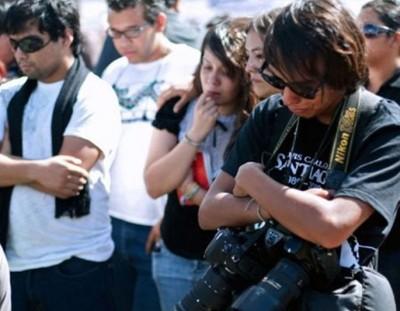
A reporter mourns the death of his colleague. (Photo: Vanguardia)
After leaving (or trying to leave) years of dictatorships and civil wars behind, it seemed as if Latin America was finally on the right path towards democracy. However, in the last decade Latin America has been held up on that path due to increased violence, deteriorating legal climates, and media — including internet — censorship. If the trend continues in the same direction, not only is “Mexico’s future as a democracy at risk,” as Joel Simon from the Committee to Protect Journalists stated, but so is the democratic future of many other Latin American countries.
At a time when many Latin American countries are attempting to work on strengthening their democracy, can they really afford to set freedom of press to the side? Can democracy truly be achieved while governments censor the media? These questions and more related to the current situation of freedom press — or the lack thereof — in many, if not most Latin American countries were discussed last month at a briefing on freedom of the press in Latin America hosted by U.S. Representative Sam Farr. At the event, Commissioner Dinah Shelton from the Inter-American Commission on Human Rights; Joel Simon, Executive Director from the Committee to Protect Journalists; and Delphine Halgand, Washington, D.C. Director from Reporters Without Borders, discussed downward trends of press freedom in Latin America.
Some of the highlighted figures during the briefing dealt with the criminalization of dissent through defamation laws, increased violence towards journalists in the hands of organized crime groups and governments, and a deteriorating legal climate that leads to impunity. Despite the fact that many Latin American countries have recently rejected laws on defamation, Latin America unfortunately continues to lead the world in prosecuting journalists via criminal defamation laws. In most cases, it is through defamation laws that the criminalization of dissent has been made possible, leaving no legal space for journalists to defend themselves after reporting negative (though true) information on government actions.
Additionally, there has been increased violence against journalists that has resulted in, as Commissioner Shelton stated, an average of one journalist murdered per month, with 119 murdered between 2006 and 2011, and 157 cases of impunity (where killings of journalists were not thoroughly investigated or no one was charged) between 1995 and 2005. Due to the increased violence and oppression targeting professional journalists, many “netizens” are turning to reporting over the Internet, as it provides a space that cannot as easily be censored by governments.
However, according to Perspectiva, an online Spanish-language economics and political science magazine, even though the Internet does provide a space that cannot easily be censored, some forms of government censorship are present in most Latin American countries, especially in Cuba, Ecuador, Argentina, and Venezuela.
As a result of the recent “netizens” phenomena, those who speak out online are now targeted for censorship through violent retaliation. Now, not only formal journalists but also these “netizens” face the danger of an increase in murders at the hands of organized crime groups for denouncing or even discussing drug cartel activities online.
This increasing violence alone would be a major challenge to overcome. When combined with what Joel Simon called “a deteriorating legal climate,” the result is often impunity for those who target journalists, which poses difficulties in providing a safe environment for true freedom of the press.
Given the hostile environment towards press freedom in Latin America, it is a challenge to think of ways to improve the situation. The issue has been well dissected, but it still remains complex. There is not only one actor to blame. The downward trend in press freedom is a result of increased violence towards journalists in the hands of organized crime groups and governments, criminalization of dissent through defamation laws, and a deteriorating legal climate that leads to impunity. All of which leads to the question of: what must be done to shift the current trend in press freedom?
Although it is most convenient for some governments and organized crime groups to censor the media and let the situation remain as is, an improved legal climate where laws aim at providing greater liberties and protection to journalists; better law enforcement; and a judicial system that aims at eliminating impunity can all help to provide a truly open and safe environment for exercising press freedom in Latin America. If left unaddressed, the deteriorating climate for press freedom could pose a threat even to countries that are trying to strengthen their democracies. However, steps taken towards improving the legal climate can lead Latin American countries in the right direction.

